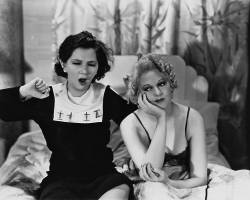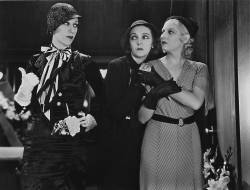Movie Review
Female Comedy Teams
http://www.edition-filmmuseum.com/product_info.php/info/p112_Female-Comedy-Teams.html

|

|
(Swans - April 9, 2012) It was with great anticipation that I greeted the announcement by Edition Filmmuseum last year of the imminent release of a DVD set entitled Female Comedy Teams. Having recently discovered the joys of a handful of short films Thelma Todd made with Zasu Pitts and Patsy Kelly in the early thirties, I was keen to see more of them, particularly as the prints I had seen were in battered condition.
The Edition Filmmuseum is a project based in Munich, specializing in the restoration and issuing on DVD of rare and unusual silent and early sound films, as well as more recent experimental, alternative, and documentary films. The project has a well-earned reputation for the quality of its film restoration work, and I felt confident that it's release would present these films in the finest quality since their initial release around 80 years ago. Those expectations were not disappointed, as the films in this set look far better than I had thought possible.
The set is devoted to comedy shorts produced by Hal Roach Studios featuring female leads, and begins with two silent short films featuring Anita Garvin and Marion Byron. Portions of the first film, Feed 'em and Weep, are missing, but Edition Filmmuseum has filled those sections out with stills and explanatory text. Byron, who played Buster Keaton's love interest the year before in Steamboat Bill, Jr., is unrecognizable in her outlandish costume, and the short is more interesting than entertaining. Byron is back to her fetching flapper image in the next short, A Pair of Tights, which is a much stronger film, and from this point on the laughs never slacken. One aspect that all of these films share in common is that the protagonists are working girls who live in the real world, the Depression era, when it could be a struggle just to survive. This in itself presents a refreshing contrast with current American films, a reality-free world in which no one has to worry about paying their bills.
The set up in A Pair of Tights is the impending visit of Byron's boyfriend and his boss. Garvin, like Byron, is poor and hungry and expresses the hope that the gentlemen will take them out to dinner. The comedy tension is that Byron's boyfriend is broke, and his boss is tight with his money, so the goals of the two sets of characters are immediately placed in opposition to each other. Garvin leans out of her second story window as the two men arrive. She overhears the boss, played by Edgar Kennedy, tell Byron's boyfriend, "We don't have to spend any money on these Janes, do we?" Garvin demonstrates how rich comedy can be mined through the simplest means, from her reaction to Kennedy once he enters the apartment, to the riotously funny sequence when Kennedy sits down next to Garvin and she simply stares contemptuously at him for an uncomfortably long time, as Kennedy becomes increasingly flustered. Eventually they all go for a ride, with the issue of dinner still unsettled. Byron sees an ice cream parlor, but Garvin warns that ice cream will spoil their appetites for dinner -- a comment that causes Kennedy to send Byron in to buy ice cream for everyone. What follows is an elaborate comedic study in repeatedly thwarted effort, as the simple act of obtaining ice cream becomes an impossible task, culminating in chaos. It is a beautifully constructed film, one of the finest silent comedy shorts.
The partnership of Garvin and Byron lasted for only three films. Hoping to duplicate the success of Laurel and Hardy, Hal Roach teamed Thelma Todd with her friend, ZaSu Pitts. Altogether the pair made 17 sound films together, of which five are presented here. In one of them, Asleep in the Feet, Todd and Pitts return to their cramped, rundown apartment, exhausted from a day at work. They overhear the landlady threatening their neighbor with eviction if she doesn't pay $20 in back rent, setting the story in motion, as our heroines try to figure a way to come up with the money to help their neighbor. Another neighbor -- played by Garvin -- works in a dance hall where men pay 25 cents to dance, and suggests that Todd and Pitts join her there to earn some extra money. The sublimely ditzy Pitts is less than pleased at the prospect, and says: "You'll never catch me there. Never, never, never." Predictably, in the very next shot, she is fox trotting with a man. She does her best to avoid his ample beard, and clearly she is hating every moment of the experience. Todd doesn't fare any better, having been latched onto by a persistent sailor. Meanwhile, Pitts loses her heel, and she and Todd repair to the dressing room. The evening by this point has not been pleasant, but they have few tickets to show for their efforts, and remain far short of earning the $20 they need. In walks Garvin, with a long string of dance tickets, and Todd asks if she had danced with that many men, only to be told that all of the tickets were from just one dance. Intrigued, Todd wants to know how that was managed, and Garvin's demonstrates through energetic gyrations of her hips that it was done through the display of sex appeal. A moment later, another dancer opens her locker, and a flood of tickets cascade to the floor. Pitts lets out a gasp, and observes, "Oh, she must have broke her back for them."
While off screen, Garvin is giving the decidedly unsexy Pitts lessons in how to flaunt sex appeal, two evangelical bluenoses enter the dance hall, with a constipated-looking sheriff in tow. One of the employees spots the badge and warns the manager, played by Billy Gilbert. The manager stops the dance and warns his customers, telling them to dance "nice, like your grandmothers." Meanwhile, Pitts, unaware of what has happened, is still in the backroom, learning how to be alluring and sexually provocative. Out walks Garvin, followed by Pitts, whose makeup is wildly overdone, to the point of making Todd do a double take. As Pitts swishes her way into the now subdued crowd, sedately dancing to foursquare music, Pitts puts on a show for the sheriff, trying to encourage him to dance with her. The religious zealots decide that the sheriff should dance with Pitts, "to get some evidence," so he walks up to her and asks for a dance. "Oh sure. Hot-cha, boop-boop-ee-doo," responds Pitts in her typically passive tone of voice. What follows next can only be described as worlds in collision. It's nice to see a film poke fun at religious narrow-mindedness, something unimaginable in current mainstream films.
Pitts left the series over a contract dispute, and was replaced with Patsy Kelly. Whereas Pitts played a passive and empty-headed character, Kelly provided Todd with a very different foil. While the character Kelly portrayed was no brighter than Pitts's, Kelly's persona was the polar opposite: a tough, brash smart aleck. There was no situation so bad that Kelly couldn't make it worse by mouthing off. She and Todd made several short films together, of which five appear in this set.
In their first film together, Beauty and the Bus, the pattern for Kelly's character is set. In the first scene, Kelly, accompanying Todd, enters a crowded theatre with all of the reserve of a hurricane. A raffle is being held, and sure enough, Todd and Kelly -- not without difficulty -- win the prize, a beautiful 1932 Ford roadster. Soon, we see the car being driven by Todd, with Kelly sitting in the front seat. "Say, how fast can this thing go?" challenges Kelly, and we know it won't be long before they encounter a highway patrolman. Sure enough, they do, and each time Todd manages to talk her way out of a ticket, Kelly mouths off and spoils the opportunity.
After being finally issued a speeding ticket, it isn't long before the Ford roadster is involved in a fender bender. The driver of the other vehicle is a man of comically ineffectual manner. He's clearly unhappy over his car being hit and complains. Kelly leaps out and says, "We didn't hit it any harder than that," as she kicks the fender of his car quite hard, knocking it to the ground. What transpires next is a series of mounting destruction as only the Hal Roach Studios could do, until the finally the entire intersection is snarled with dozens of smashed cars jammed together. A policeman, standing amid the mess, bellows, "Whoever caused this is going to hang." It can't get any worse, one thinks, just as Kelly, standing atop a truck, yells, "Who wants to make something out of it?"
Sadly, the series came to an end with the untimely death of Thelma Todd. She owned a restaurant that was so popular that the Mafia tried to muscle its way in. She refused to go along, and soon turned up dead in what was clumsily made to appear a suicide. Certain aspects of her death indicate that murder was the more probable cause.
Thelma Todd is not as well remembered these days as she deserves to be, and this set is a wonderful tribute to her work. For those of a certain age, the typically jazzy Hal Roach soundtracks are enough to bring a smile. Each short is packed with so much humor that they can only be described as pure delight.
The Edition Filmmuseum's set, although produced in Germany, is region-free, so it should be playable in any country. It is in PAL format, however, so viewers in North America need a player capable of converting a PAL signal to NTSC format.
If you find Gregory Elich's work valuable, please consider helping us
Legalese
Feel free to insert a link to this work on your Web site or to disseminate its URL on your favorite lists, quoting the first paragraph or providing a summary. However, DO NOT steal, scavenge, or repost this work on the Web or any electronic media. Inlining, mirroring, and framing are expressly prohibited. Pulp re-publishing is welcome -- please contact the publisher. This material is copyrighted, © Gregory Elich 2012. All rights reserved.
Have your say
Do you wish to share your opinion? We invite your comments. E-mail the Editor. Please include your full name, address and phone number (the city, state/country where you reside is paramount information). When/if we publish your opinion we will only include your name, city, state, and country.
About the Author
Gregory Elich is an independent researcher, a journalist, and an activist. (back)
